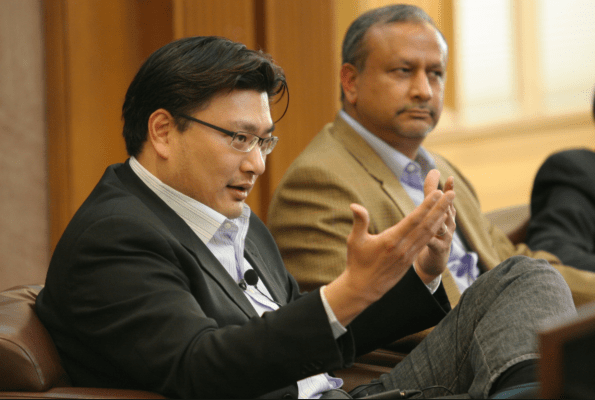President Donald Trump has repeatedly threatened to launch a trade war with China, threats that the country is beginning to take ever more seriously.
Over at GGV Capital, a Silicon Valley-based venture capital firm that’s been actively investing in China for more than 15 years, managing director Hans Tung seems to be watching the jockeying with some wonderment – and patience.
The China native suggests he’s taking his cues from his network, including in Shanghai and Beijing, where GGV has offices. “China isn’t so much concerned with [President Trump yet]; they understand that he can turn right one day and turn left the next to win support. The general thinking is: Let’s see what happens when it comes to actual negotiations. I think the [Chinese government] doesn’t want to overreact in any given moment.”
Tung also shares the same worldview as Jack Ma, the founder and CEO of the e-commerce giant Alibaba, which received early funding from GGV. (The firm had sold its stake some time before Alibaba went public in 2014.) Ma had said last week at the World Economic Forum in Davos that China should give Trump some time to settle in, adding that a “trade war would be a disaster for the world.”
Ma said he felt so passionately that, given a choice between keeping his company alive or averting a trade war he would “shut Alibaba down.” That’s not simple theatrics, seemingly. Ma stated his concerns about a trade war in August, telling CNN, “We should keep on going along the path of globalization. Globalization is good . . . when trade stops, war comes.”
Tung yesterday suggested that China is largely being made a scapegoat by Trump – or sees things that way, in any case. The government “looks at how much the U.S. has spent on wars with Iraq and other things instead of creating jobs and boosting its own capabilities in the Rust Belt. China [will tell you it] never tried to steal jobs. If the U.S had done a better job of reinvesting its money and gotten multinationals to repatriate their money back to the U.S., it would be in much better shape.”
The big question specifically for Tung — who logs hundreds of thousands of miles each year traveling between the two countries — is how suddenly icy relations between the Trump administration and China could impact his own work.
He seems genuinely unconcerned for now, saying GGV is largely in “wait-and-see mode.” Tung also notes that some of the firm’s e-commerce bets in particular are “here to stay” no matter the geopolitical quarrels happening in the background.
Likely, he includes in this company the mobile e-commerce app Wish, which sells novelty items from China at rock-bottom prices and has an annual run rate in the “middle single billions” of dollars, according to fellow investor Joe Lonsdale.
Another GGV bet that Tung is quick to praise is Red, called Xiaohongshu (Little Red Book) in Chinese; it’s a social discovery e-commerce platform aimed at helping people in China buy discounted brand-name goods from overseas.
More broadly, says Tung, it’s “business as usual,” with the firm preferring to focus on the business-friendly talk coming from new administration.
While the U.S.’s relationship with China remains uncertain here in the U.S., “I do think there will be some deregulation and industry consolidation,” he says. “I think it’s going to be easier for M&A to happen now.”
